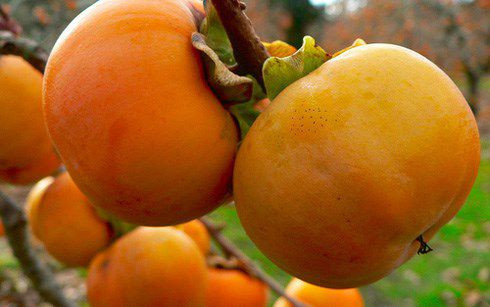Deadly mistakes when eating persimmons
Persimmon is a favorite fruit of many people because it is sweet and easy to eat, but you need to pay attention to the following taboos.
According to the Encyclopedia, persimmon is a fruit tree of the genus Persimmon and originated in China. Persimmon fruit is orange-yellow to orange-red depending on the variety.
Every September - October, when mentioning autumn fruits, people cannot forget the sweet, crunchy taste of persimmons.
Persimmons have a sweet, astringent taste and cold properties. They have the effect of clearing heat, eliminating dryness, moistening the lungs and eliminating phlegm, softening the stomach, quenching thirst, strengthening the spleen, treating dysentery, stopping bleeding, etc., helping to reduce constipation, pain caused by hemorrhoids or diseases such as bleeding, dry cough, sore throat, high blood pressure.
 |
Persimmons are a favorite fruit of many people because they are sweet and easy to eat. However, when eating them, you need to pay attention to the following taboos:
Do not eat when hungry
Because persimmons contain a lot of tannin and pectin, if eaten on an empty stomach, they will coagulate under the effect of stomach acid. If these coagulated masses cannot reach the small intestine through the pylorus, they will remain in the stomach and form stones there.
If this stone is not excreted naturally, it will cause digestive tract obstruction, causing symptoms such as upper abdominal cramps, vomiting, and even vomiting blood...
Do not eat persimmon peel
Most of the tannin in persimmons is concentrated in the peel. When removing the astringent taste of persimmons, it is impossible to remove all the tannin. Therefore, you should not eat the persimmon peel. If you eat the whole peel, it can easily form stones in your stomach.
Do not eat persimmons with crab dishes.
In Oriental medicine, crab and persimmon are both cold foods, so they cannot be eaten together.
From a modern medical perspective, crabs, fish, and shrimp are rich in protein, which under the effect of tannin in persimmons can easily lead to precipitation, forming stones in the stomach.
People with diabetes, diarrhea, and stomach disease should avoid eating persimmons.
Persimmons contain 10.8% carbohydrates, most of which are simple disaccharides and monosaccharides, so they are easily absorbed after eating, causing blood sugar to rise. For people with diabetes, especially those with poor blood sugar control, it is extremely harmful.
In particular, people with diarrhea, weak body, postpartum women and people with colds should not eat; people with poor stomach function, chronic gastritis, indigestion, people with stomach surgery should also not eat.
Do not eat persimmons with goose meat at the same time.
Goose meat is rich in protein, high quality protein. When protein meets tannin in persimmons, it easily condenses into tannic acid protein, accumulates in the stomach, and in severe cases can cause death.
Do not eat persimmons when drinking alcohol
Persimmons are cold, while alcohol is spicy, slightly bitter, hot and toxic. When alcohol enters the stomach, it stimulates intestinal secretions. Tannin in persimmons enters the stomach and forms a viscous, sticky substance that easily combines with cellulose to form blood clots, which are difficult to digest and cannot be excreted. Over time, this will cause intestinal obstruction.
Health benefits of persimmons
Skin care
Because it contains a lot of Vitamin C, A, and iron, it helps to make the skin rosy and maintain the correct composition of blood, improving the health of the skin and hair.
Anti-aging
A new study in Japan has proven the anti-aging effects of persimmons thanks to the proan-thocyanidin compound group found in abundance in the peel, which helps protect cells from oxidation and strengthens eyesight.
Remedies for hiccups
In Japan, persimmons are widely used by medical practitioners to treat hiccups. These remedies are simple, relatively easy to find, cheap, but extremely effective. Usually, they only take half a day to cure, if the disease has been too long, it will only take 3 days at most to cure completely.
Prevent cardiovascular diseases
Persimmons contain a lot of sugar, mostly glucose and fructose, which helps blood vessels circulate, strengthens the heart muscles while maintaining blood sugar levels at normal levels.
Prevent cancer
Because persimmons are high in beta carotene, compounds like sibutol and betulinic acid have been studied for their anti-cancer effects.
Strengthen the immune system
Persimmons contain a lot of vitamin C, a powerful antioxidant that, if absorbed into the body regularly, will help strengthen the immune system.
Therefore, you can eat persimmons regularly to prevent and treat some common diseases such as colds, flu, lung infections, asthma...
Treatment of diarrhea: Use 2 persimmons on top of steamed rice and eat.
Treatment of high blood pressure, dry cough due to chronic bronchitis, sore throat:3 persimmons (remove stems), wash and drain, add appropriate amount of rock sugar, steam until soft and ready to use.
Treatment of urinary tract infections, urinary tract bleeding:2 persimmons, 6 grams of rush grass, cook into soup, add white sugar to taste, drink twice a day./.
According to Giadinh.net


